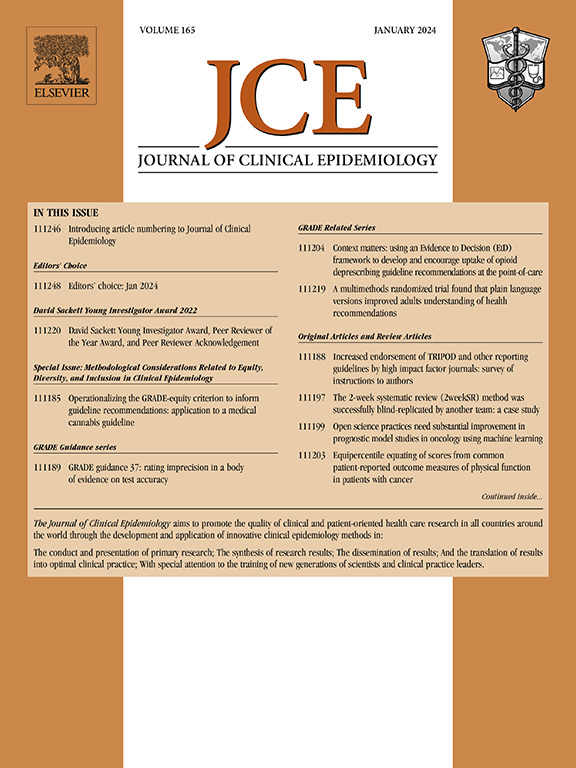出版商对已发表研究证据和建议改进的完整性问题的反应不一致。
IF 5.2
2区 医学
Q1 HEALTH CARE SCIENCES & SERVICES
引用次数: 0
摘要
目的:整理、回顾和评论出版商对诚信问题的反应研究设计和背景:我们对出版物进行了一项叙述性回顾,报告出版商对其期刊上发表的研究诚信问题的反应。我们还借鉴了广泛的个人经验,并对出版商对172个临床试验出版物的诚信问题的回应进行了新的分析,这些问题是在与受影响的出版商同时提出问题5年后由一个研究小组提出的。结果:现有证据报告表明,无论是在临床还是临床前学科中,出版商对诚信问题的反应缓慢、不完整和不透明是很常见的。当我们同时向出版商提出关于大量期刊文章的非常类似的担忧时,解决问题的时间明显不同,结果从没有编辑行动到所有论文被撤回不等。结论:出版商对其期刊中关于出版物完整性问题的通知的回应在时间和编辑决策的性质上都明显不一致。这些不一致的原因尚不清楚,但可以通过涉及出版商诚信工作人员和具有出版诚信专业知识的学者的协作和透明过程来解决。了解不同结果的原因可能有助于改进,从而提高生物医学文献的可信度。本文章由计算机程序翻译,如有差异,请以英文原文为准。
Inconsistency in publishers' responses to integrity concerns about published research. Evidence and suggested improvements
Objectives
To collate, review, and comment upon publishers’ response to integrity concerns.
Study Design and Setting
We conducted a narrative review of publications reporting the responses of publishers to concerns about the integrity of research published in their journals. We also drew upon extensive personal experience and a new analysis of publisher responses to integrity concerns about 172 clinical trial publications by a single research group 5 years after the concerns were raised simultaneously with affected publishers.
Results
Existing evidence reports that slow, incomplete, and opaque responses from publishers to integrity concerns are common, in both clinical and preclinical disciplines. When we raised very similar concerns about a large set of journal articles simultaneously with publishers, times to resolution varied markedly, and outcomes ranged from no editorial action to all papers retracted.
Conclusion
Publishers' responses to notification of concerns about the integrity of publications in their journals are markedly inconsistent, both in their timing and the nature of their editorial decisions. The reasons for these inconsistencies are unknown but could be addressed by a collaborative and transparent process involving publisher integrity staff and academics with expertise in publication integrity. Understanding the reasons for the disparate outcomes is likely to facilitate improvements which will enhance the trustworthiness of the biomedical literature.
Plain Language Summary
Existing evidence reports that publishers are slow to assess concerns about the reliability of research publications, and their assessments produce markedly inconsistent outcomes. Our finding of widely disparate outcomes of publisher assessments of overlapping concerns about 172 clinical trials by a single research group reinforces this point. Improving the timeliness, transparency, and systematicity of publisher assessments is likely to enhance the reliability of published research.
求助全文
通过发布文献求助,成功后即可免费获取论文全文。
去求助
来源期刊

Journal of Clinical Epidemiology
医学-公共卫生、环境卫生与职业卫生
CiteScore
12.00
自引率
6.90%
发文量
320
审稿时长
44 days
期刊介绍:
The Journal of Clinical Epidemiology strives to enhance the quality of clinical and patient-oriented healthcare research by advancing and applying innovative methods in conducting, presenting, synthesizing, disseminating, and translating research results into optimal clinical practice. Special emphasis is placed on training new generations of scientists and clinical practice leaders.
 求助内容:
求助内容: 应助结果提醒方式:
应助结果提醒方式:


